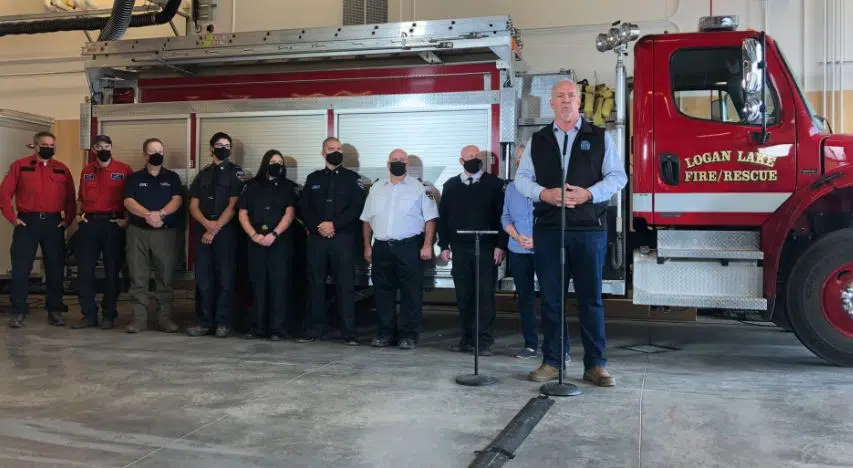
Premier John Horgan in Logan Lake on August 27, 2021 (Photo via Colton Davies)
The Premier says wildfire preparation will be “a key focus” in the next provincial budget.
Speaking Friday afternoon from Logan Lake, John Horgan, said many people in the Interior have been rattled by this summer’s wildfire season.
“We’ve learned a great deal from what’s happened and we need to put that into practice so the budget process for Budget 2022-23 will have at its centre a commitment to making sure that we as best prepared as we can be for the fire seasons that are coming ahead of us,” he said.
Horgan noted the wildfire fight in the province has typically been funded through contingencies.
“A certain amount of money is in the budget and if you go over that you dip into contingencies and I don’t think we should be putting our communities at risk based on contingencies,” he said.
“If we have resources at the front end of the year, the BC Wildfire Service can retain people to assist with FireSmart, can create guards around those interface communities. That’s got to be the way we go forward.”
Horgan says the move will help ensure there is a year round approach to fighting wildfires in the province instead of one that is just focused on the summer months.
“[Forests] Minister [Katrine] Conroy will be bringing forward submissions to the treasury board to get approval for resources. Those programs will be developed. They are well underway,” Horgan said.
“We’ve got classic examples here of success stories, so we’ll put those programs in place, and I’m confident that Budget 2022 will demonstrate to communities that we are on board and we’re right behind them.”
One such success story is the community of Logan Lake which was evacuated back on August 12, two days before the Tremont Creek fire burned into the municipal limits. Residents were allowed to return home last week before they got the all clear this past Wednesday.
While no structures were destroyed in Logan Lake, other communities like Monte Lake and Lytton were not as lucky.
“All British Columbians have been rattled over the past two years, and these challenges are particularly acute in communities like Logan Lake and those that have been affected by the fires,” Horgan added. “Climate change is here to stay. We need to take steps to protect communities, protect property and protect people.”
“We have had in 2017, 2018 and now 2021, three of the worst fire seasons in B.C. history. We need to make sure that we do have a committed program across the province.”
Earlier this week, the BC General Employees Union (BCGEU) told NL News the BC Wildfire Service should be remade into a year-round, professionalized service like other fire departments.
“The problem is the seasonal nature of how it is treated,” BCGEU Treasurer Paul Finch said, on the NL Noon Report, noting because of low pay and no job security the service struggles to retain highly trained professionals.
“With these elongated fire seasons you really need a core of dedicated professionals that are employed across the year because in the off-season you’re just going to be doing prep and training and recruitment for the next season.”
So far this wildfire season, the BC Wildfire Service has told NL News it has spent $494-million fighting wildfires.
– With files from Colton Davies







